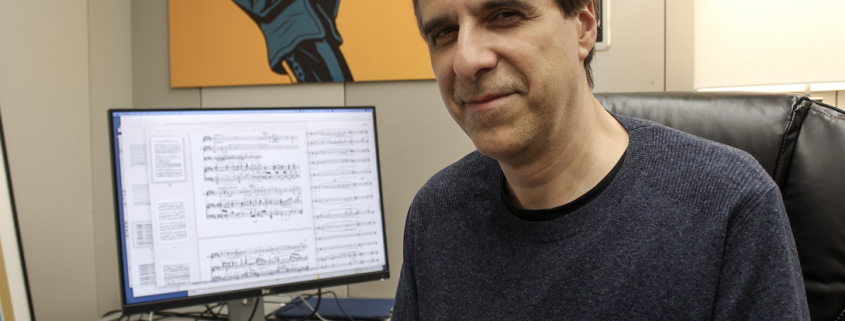Thornton professor earns 30th Grammy nomination

The orchestra starts playing and USC’s own Vince Mendoza is at the front, waving his hands and baton, commanding musicians to play his arrangement. As he conducts the performance, Mendoza hopes his music will illustrate a story that will resonate with the audience.
Mendoza, an adjunct professor of jazz composition at the Thornton School of Music, is an accomplished composer who has arranged and conducted for quartets and orchestras worldwide. At the 61st Grammy Awards Sunday night, Mendoza will be among the nominees for the music industry’s most prestigious awards.
Mendoza was nominated for two of his works: “Mona Lisa,” for Best Arrangement, Instrumentals and Vocals and “If You Really Want” for Best Jazz Vocal Album.
“The Grammy nomination is a form of recognition that, yes … we hear what you’re doing, and we want you to continue,” Mendoza said.
In his 25 years of composition, Mendoza has received five Grammy awards and 30 Grammy nominations.
“I love being in the world of music and creating music and meeting great musicians and being inspired and inspiring people,” Mendoza said.
Mendoza’s rearrangement of “Mona Lisa,” a signature song produced by Nat King Cole in 1950, is a tribute to the composer’s 100th birthday and a testament to Cole’s efforts in breaking race barriers.
“[Cole’s] music is important both because of the beauty in the far-reaching power of his music throughout the world but also by nature of how difficult it was for an African American musician to be successful on a larger scale.” Mendoza said.
The origins of “If You Really Want” come from Hilversum, a town in the Netherlands where Mendoza wrote and rearranged a record with Raul Midon, an American jazz and pop singer-songwriter, and the Metropole Orkest, a Dutch orchestra.
“I was the chief conductor of the Metropole for nine seasons,” Mendoza said. “We put [Raul Midon] in the middle of this orchestra and arranged his songs.”
Bob Mintzer, a professor of jazz studies at the Thornton School of Music, is a long-time friend of Mendoza.
“Everything Vince has done has huge substance due to the fact that he has such an individual voice, and he really knows music in a very broad way,” Mintzer said. “He is well-deserving to say the least.”
Mendoza’s passion for music started from a young age.
“I came from a musical family,” Mendoza said. “My mother and her brothers all played instruments. And I think my earliest memory really of music was … that I grew up listening to the radio.”
According to Mendoza, specific genres and musical movements such as Motown Soul and the Philadelphia sound inspired his love for jazz music.
“I would listen to the radio as a child and think about what it would be like to be in the studio with Arisa, Stevie Wonder or to conduct the orchestra with Earth, Wind & Fire,” Mendoza said.
Mendoza began playing the guitar at six years old and started playing the trumpet and arranging band music in high school. With many musical influences under his belt, Mendoza soon received the opportunity to display his passion by composing music for his high school band.
“My first experience in writing music [was] for strings and for non-jazz instruments, electric guitar and Latin percussion and flutes and clarinets,” Mendoza said. “But [my experience] really all came from my interest in listening to the radio and musing about what could be possible.”
Since then, Mendoza has traveled around the world as a guest conductor for bands and orchestras in Japan, Scandinavia, the United Kingdom and the United States. He has also branched out to other styles, including classical music and jazz-pop.
Mallory Hauser, a senior majoring in popular composition, receives individual instruction from Mendoza. She said Mendoza has pushed her limits and driven home the importance of every individual note.
“I think he has a lot of wisdom, and he definitely brings another dimension to the idea of creating music and supporting what emotions you want to convey in the best way you can, musically speaking,” Hauser said.
To Mendoza, being nominated and winning awards is an added bonus to the main reason he works as a composer.
“To have your work acknowledged by an organization of your peers is a great thing for an artist to have that extra impetus to continue to do what you’re doing,” he said.

